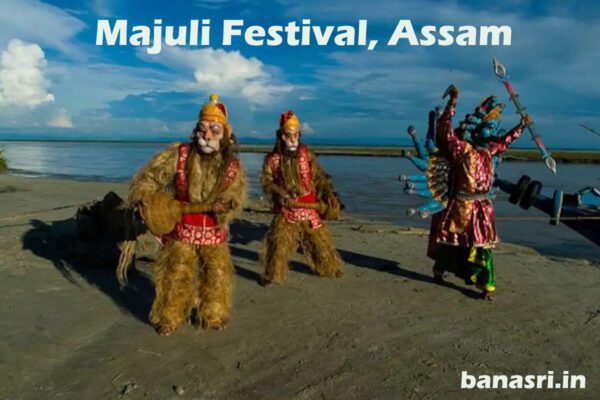
Majuli Festival, Assam: A Celebration of River Island Culture and Heritage
Introduction
The Majuli Festival is an annual cultural extravaganza held on Majuli, the world’s largest river island, situated in the Brahmaputra River in Assam. This festival is a grand showcase of Assam’s rich cultural heritage, traditional arts, crafts, and ecological beauty, attracting visitors from all over the world.
Timing of the Festival
- When: The Majuli Festival is typically held in November each year.
- Significance: The festival celebrates the cultural richness and ecological significance of Majuli, aiming to promote the island as a unique tourist destination.
Locality of the Festival
- Where: The festival takes place on Majuli Island, particularly around the Kamalabari Satra, one of the principal centers of Vaishnavite culture on the island.
- Communities Involved: The festival involves the participation of the local Mising, Deori, and Assamese communities, as well as visitors and artists from across India and abroad.
Nature of the Festival
- Type: The Majuli Festival is a cultural festival that includes traditional performances, exhibitions, and ecological activities.
- Essence: The festival aims to celebrate and preserve the unique cultural and ecological heritage of Majuli Island.
Highlights of the Majuli Festival
Cultural Performances
- Traditional Dances and Music:
- Performances: The festival features an array of traditional dances and music, including the Sattriya dance, which is an integral part of the island’s Vaishnavite monasteries.
- Significance: These performances highlight the cultural and spiritual heritage of Majuli.
- Specialty: Folk dances like Bihu, Mising Bihu, and Deori Bihu are performed, showcasing the diversity of the island’s ethnic communities.
- Theatre and Drama:
- Plays: Traditional Assamese theatre, including Ankia Naat (one-act plays), is performed.
- Importance: These plays often depict mythological stories and moral lessons, reflecting the cultural ethos of the region.
- Specialty: The use of traditional costumes, masks, and music adds to the authenticity and charm of these performances.
Art and Craft Exhibitions
- Handicrafts and Handlooms:
- Exhibits: Local artisans display their crafts, including pottery, masks, handwoven textiles, and bamboo products.
- Importance: These exhibitions provide artisans with a platform to showcase and sell their products, promoting local craftsmanship.
- Specialty: Visitors can purchase unique handmade items, supporting the local economy and preserving traditional arts.
- Culinary Delights:
- Food Stalls: Various stalls offer traditional Assamese cuisine, including pithas (rice cakes), fish preparations, and tribal dishes.
- Significance: The food stalls provide a taste of the local culinary traditions and are a major attraction for visitors.
- Specialty: The use of local ingredients and traditional cooking methods makes the culinary experience unique and authentic.
Ecological Activities
- Nature Tours:
- Tours: Guided tours of the island’s unique ecosystems, including visits to the wetlands, bird watching sites, and agricultural fields, are organized.
- Significance: These tours educate visitors about the ecological importance of Majuli and the need for conservation.
- Specialty: Majuli is a haven for birdwatchers, with numerous migratory and resident bird species, making these tours a highlight for nature enthusiasts.
- Workshops on Sustainability:
- Events: Workshops and seminars on sustainable living, organic farming, and environmental conservation are conducted.
- Purpose: These events aim to raise awareness about environmental issues and promote sustainable practices among locals and visitors.
- Specialty: Experts and activists share insights and engage with participants, fostering a community committed to conservation.
Adventure and Recreational Activities
- Boat Races:
- Event: Traditional boat races on the Brahmaputra River are a thrilling aspect of the festival.
- Engagement: These races attract competitors and spectators alike, showcasing the riverine culture of the island.
- Specialty: The boat races emphasize teamwork and the islanders’ deep connection with the river.
- Cultural Processions:
- Procession: Colorful processions featuring traditional music, dance, and costumes are organized.
- Significance: These processions are a visual treat, highlighting the cultural vibrancy of Majuli.
- Specialty: The participation of various ethnic groups in the processions symbolizes unity and cultural diversity.
Specialty of Majuli Festival
- Cultural Significance: The festival is a vibrant display of Majuli’s rich cultural heritage, showcasing traditional arts, crafts, and performances.
- Ecological Focus: It promotes awareness about the unique ecological environment of Majuli and the importance of conservation efforts.
- Tourism Promotion: The festival aims to boost tourism on Majuli Island, highlighting its cultural and natural attractions to a wider audience.
- Community Engagement: It fosters a sense of community and pride among the local population, encouraging them to preserve their cultural and natural heritage.
Conclusion
The Majuli Festival of Assam is a unique celebration that blends cultural heritage, ecological awareness, and community spirit. Held on the picturesque Majuli Island, the festival not only promotes the island’s rich traditions but also highlights the importance of preserving its unique environment. Through its diverse activities and events, the Majuli Festival provides a platform for cultural exchange, environmental education, and sustainable tourism, making it a truly enriching experience for all who attend.

I am really inspired along with your writing talents and also
with the structure for your blog. Is that this a paid subject matter or
did you customize it your self? Either way keep up the excellent high quality
writing, it’s uncommon to see a great blog like this one today.
TikTok ManyChat!
I am extremely impressed together with your writing abilities as smartly as with the format in your weblog.
Is this a paid subject matter or did you modify it your self?
Anyway keep up the nice high quality writing, it is uncommon to see
a nice weblog like this one today. LinkedIN Scraping!